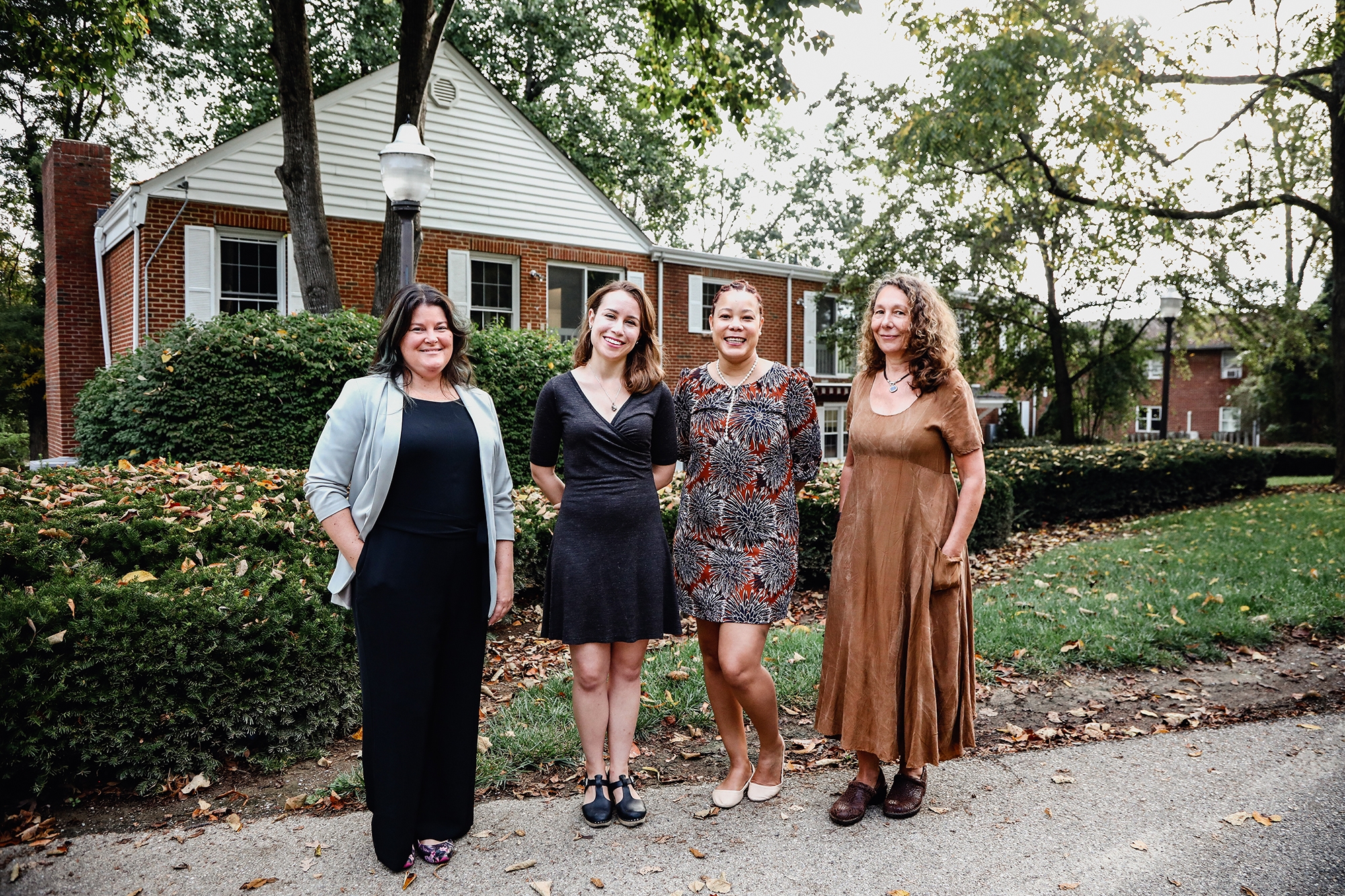Faculty Fellows program fosters connections between faculty, students, and community

Through collaboration, research, and education, the 2021-22 VT Engage Faculty Fellows program fosters new ways of connecting faculty with students and the wider community. This is the fifth year for the VT Engage Faculty Fellow program.
The faculty fellows this year are:
- Robin Scully, art program director of Perspective Gallery, Student Engagement and Campus Life
- Andrea Baldwin, assistant professor of Black feminisms, College of Liberal Arts and Human Sciences (CLAHS)
- Chelsea Lyles, associate director of Broader Impacts at the Center for Educational Networks and Impacts (CENI), a center aligned with the Institute for Creativity, Arts, and Technology
- Jessica Taylor, assistant professor of oral and public history, CLAHS
- Courtney Powell, community and culture manager at the Virginia Tech Carilion School of Medicine (VTCSOM).
The goal of the yearlong VT Engage Faculty Fellows program is to increase the prevalence of and quality of community engagement in the curriculum at Virginia Tech through faculty-led experiences in the areas of service learning, leadership education, and civic engagement. Dedicated scholar-educators join selected fellows to integrate high-impact, ethical, community-based learning experiences into their academic courses and programs. VT Engage, a unit of Virginia Tech Student Affairs, provides financial resources and technical support to fellows.
“This program is an opportunity to develop the faculty members’ understanding of the field of service learning and community engagement as more than a pedagogy. It’s a praxis, an opportunity for meta reflection on the theories behind the how and the why of the work,” said Catherine Cotrupi, assistant director for campus and community engagement and interim assistant director for faculty engagement with VT Engage.
VT Engage is committed to students, faculty, staff, and administrators through the university’s land-grant goals of research, instruction, and outreach. The Faculty Fellows program bridges student affairs and academic affairs through these three areas of learning.
Scully and Baldwin will work on a collaborative project. Baldwin, a faculty member in the department of sociology, explained that the project is a partnership between the Perspective Gallery’s Art Reach Program, Women’s Center’s (Dis)course Project, and Black Women Radical, a Black feminist organization. Scully’s plan is to evolve the "Black Love" exhibit into an annual Black History month event, involving students, academic partners, and the wider community. Perspective Gallery, in collaboration with the Africana studies and women’s and gender studies programs, have developed a project involving academic courses, gallery exhibits, and student engagement.
“The project will focus on connecting teaching, research, the arts, and activism in an experiential project-based learning environment to engage in a pedagogical praxis that is creative and which will produce visual, textual, performance, and other art over the course of the project,” Baldwin said.
Lyles noted that her “research explores the intersections of pre-K-12 and higher education policy and finance, academic labor, and assessment of student learning.” Lyles hopes to encourage and facilitate change at the organizational level through her and her students’ work.
Lyles piloted a service learning course through the Honors College this past spring, UH 3204: Honors Service Learning. The course was a joint effort between CENI and researchers on a National Science Foundation-funded project focused on STEM education and professional foundations for engineers. She has since created a revised version of the class and will offer ENGE 2984: SS: Service Learning and Beyond in spring 2022. Current community partners include Amy Azano, associate professor of education, and Kim Keith, instructional technology resource teacher and Virginia Tech’s pre-K-12 liaison to Floyd County Public Schools. Azano is working with students to develop Supporting Autism Friendly Environments (SAFE) educational outreach events. Keith and three first-grade teachers are working with students to develop unplugged computer science activities.
The graduate course created by Taylor will include fieldwork to Pulaski, Virginia. Students will work alongside community groups and in collaboration with the Calfee Community and Cultural Center (CCCC) to create oral history, social media, and exhibit content. Taylor’s secondary goal for the course is to incorporate student’s ideas into the online digital collection Omeka exhibit, which will be featured in the CCCC museum.
“I am redesigning my graduate public history course around an oral and public history partnership with CCCC, a Black-run organization transforming a former segregated school building into a museum and functional community space in Pulaski, Virginia. The course will require students to build skills in archival research and content creation and exhibit design in collaboration with community partners,” Taylor said. She described her work as seeking to “work collaboratively with scholars and community groups representing minoritized peoples in order to document and analyze individual experience and landscape change in Virginia, and to support access to this information.”
Powell assists in managing VTCSOM’s newest addition, a service learning program called VTCSOM Engage. She became interested in joining the Faculty Fellows program, “not in the hopes of creating another new program, but to learn more about the ideas behind service learning in order to strengthen my program,” Powell said. She hopes to help VTCSOM students make the most of their time and of the talent in the New River and Roanoke valleys.
“We encourage the fellows to be creative and to learn the ways they could be supporting their partners — in ways that are meaningful to them in their spheres,” Cotrupi said. “It is critical to de-center the academy and to listen, learn, and uplift what is important to the community partners.”
The application process for the 2022-2023 Faculty Fellows program opens in April 2022. For more information visit the VT Engage Faculty Fellows website.
Written by Tayten Allison





